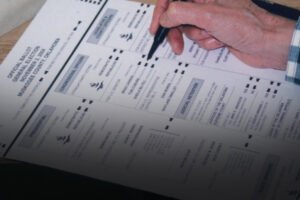 The elections are coming up quickly here in the US. I’m sure many of us are still making up our minds about which propositions and leaders we will ultimately choose. I appreciate the fact that I have the opportunity to vote, and I am always concerned about making sure my vote “counts”; that I vote for the proposition or leader who will best serve our country or best achieve our goals.
The elections are coming up quickly here in the US. I’m sure many of us are still making up our minds about which propositions and leaders we will ultimately choose. I appreciate the fact that I have the opportunity to vote, and I am always concerned about making sure my vote “counts”; that I vote for the proposition or leader who will best serve our country or best achieve our goals.
Every election cycle I inevitably hear someone bring up the same argument: “Religious people, Christians included, should not vote according to their religious convictions. It just seems wrong that a Christian would impose their beliefs on someone else who doesn’t share their religion.”
As Christians, can (or should) we vote according to our Christian beliefs?
This objection is not typically levied against non-believers. We may all disagree about what we should vote for, but religious people seldom tell the non-religious they shouldn’t vote based on their non-religious worldview. I know I personally would not expect non-believers to vote against their own convictions, so why do some non-believers think religious people should vote against theirs?
I think the issue has less to do with voting and more to do with the way we approach the nature of religious truth claims.
The idea that non-religious beliefs are worth acting (or voting) on but religious beliefs are not, assumes that religious truth claims are categorically different than and non-religious truth claims. As if religious claims are blindly subjective and non-religious claims are objectively verifiable.
However, this is not the approach taken by Jesus or the writers of the New Testament. The Bible consistently teaches that its truth claims – its claims about people, the world, how we ought to live, and what God wants from us – are objectively true. Jesus, for example, repeatedly pointed his listeners to the objective evidence of his miracles to authenticate his message. He also commissioned eyewitnesses (direct evidence) to tell the world about their observations. From a Christian perspective, there should be no categorical difference between religious truth claims and non-religious truth claims; both worldviews make objective claims about reality.
The Bible consistently teaches that its truth claims – its claims about people, the world, how we ought to live, and what God wants from us – are objectively true.
Click To Tweet
Getting back to issues around the election: the nature of voting itself assumes the people voting will come from a variety of backgrounds and hold a variety of opinions. In fact, voting reveals our preferences and worldviews. There is no expectation of uniformity or complete agreement. The ballot box is a symbol and demonstration of our intellectual diversity.
As Christians, we should confidently vote according to our Christian beliefs. We hold this worldview because it is objectively true, and it describes the world the way we actually experience it. Every voter will vote based on his or her worldview, religious or otherwise. Let’s join the rest of America and vote based on our view of the world.
Jimmy Wallace (J. Warner’s son) is a Police Officer, a Detective in Los Angeles County, a Christian Case Maker, and host of the Incarnate Investigation Podcast (featured at ColdCaseChristianity.com).
The post As Christians, Can We Vote According to Our Christian Beliefs? first appeared on Cold Case Christianity.
Read More
Cold Case Christianity
